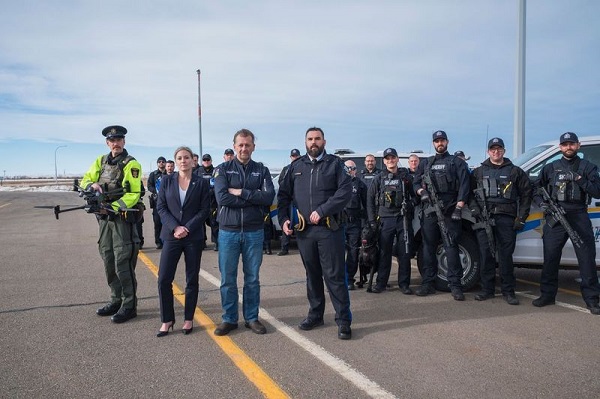Alberta
Alberta commitment to border security should satisfy US concerns

Minister of Public Safety and Emergency Services Mike Ellis and Minister of Justice and Attorney General Mickey Amery released the following statement on Alberta’s swift and unequivocal action to secure the shared Alberta – U.S. border:
“On Nov. 25, President Trump publicly warned that he would impose tariffs on Canada unless we take action on critical border issues, such as cracking down on drug smuggling, human trafficking and illegal border crossings.
“Yesterday, I met with the Canada Border Services Agency (CBSA), the RCMP and the Alberta Sheriffs at the Coutts border point of entry. In our meeting, we agreed on the importance of continued collaboration to ensure our border is secure.
“Our government has been clear from the beginning that we must take President Trump’s statements on border security seriously and take action immediately.
“That is why I joined a Fox News crew at the Coutts border to showcase the important work Alberta has been doing to secure the Alberta – U.S. border. This critical work includes the establishment of a new Interdiction Patrol Team (IPT) within the Alberta Sheriffs to combat drug smuggling, gun trafficking and other illegal activities along Alberta’s 298-kilometre international boundary. The IPT will be supported by:
- 51 uniformed officers equipped with carbine rifles (weapons for tactical operations).
- 10 support staff, including dispatchers and analysts.
- 4 drug patrol dogs.
- 10 cold weather surveillance drones capable of operating in high winds, with dedicated pilots.
- 4 narcotics analyzers to test for illicit drugs.

“I want to thank the federal government for accepting Alberta’s request to send a Black Hawk helicopter to the border yesterday, further demonstrating the actions we are taking to secure our border.
“We are also calling on the federal government to immediately appoint a Canadian border czar to work with the new American border czar to jointly crack down on fentanyl and illegal migrants.”
Mike Ellis, Minister of Public Safety and Emergency Services
“The incoming US administration has valid concerns related to illegal activities at our shared border.

“Our government is committed to enhancing border security with Montana and the U.S. by collaborating with federal authorities to tackle cross-border crime, drugs, illegal migrants and human trafficking.
“As part of these efforts, Alberta has designated a two-kilometre-deep border zone north of the entire Alberta – US border as essential infrastructure to help protect public safety and Alberta’s economic prosperity.
“We will not stand for illegal activities that put lives and livelihoods at risk on both sides of the border.”
Mickey Amery, Minister of Justice and Attorney General
Alberta
Alberta Premier Danielle Smith Discusses Moving Energy Forward at the Global Energy Show in Calgary

From Energy Now
At the energy conference in Calgary, Alberta Premier Danielle Smith pressed the case for building infrastructure to move provincial products to international markets, via a transportation and energy corridor to British Columbia.
“The anchor tenant for this corridor must be a 42-inch pipeline, moving one million incremental barrels of oil to those global markets. And we can’t stop there,” she told the audience.
The premier reiterated her support for new pipelines north to Grays Bay in Nunavut, east to Churchill, Man., and potentially a new version of Energy East.
The discussion comes as Prime Minister Mark Carney and his government are assembling a list of major projects of national interest to fast-track for approval.
Carney has also pledged to establish a major project review office that would issue decisions within two years, instead of five.
Alberta
Punishing Alberta Oil Production: The Divisive Effect of Policies For Carney’s “Decarbonized Oil”

From Energy Now
By Ron Wallace
The federal government has doubled down on its commitment to “responsibly produced oil and gas”. These terms are apparently carefully crafted to maintain federal policies for Net Zero. These policies include a Canadian emissions cap, tanker bans and a clean electricity mandate.
Following meetings in Saskatoon in early June between Prime Minister Mark Carney and Canadian provincial and territorial leaders, the federal government expressed renewed interest in the completion of new oil pipelines to reduce reliance on oil exports to the USA while providing better access to foreign markets. However Carney, while suggesting that there is “real potential” for such projects nonetheless qualified that support as being limited to projects that would “decarbonize” Canadian oil, apparently those that would employ carbon capture technologies. While the meeting did not result in a final list of potential projects, Alberta Premier Danielle Smith said that this approach would constitute a “grand bargain” whereby new pipelines to increase oil exports could help fund decarbonization efforts. But is that true and what are the implications for the Albertan and Canadian economies?
The federal government has doubled down on its commitment to “responsibly produced oil and gas”. These terms are apparently carefully crafted to maintain federal policies for Net Zero. These policies include a Canadian emissions cap, tanker bans and a clean electricity mandate. Many would consider that Canadians, especially Albertans, should be wary of these largely undefined announcements in which Ottawa proposes solely to determine projects that are “in the national interest.”
The federal government has tabled legislation designed to address these challenges with Bill C-5: An Act to enact the Free Trade and Labour Mobility Act and the Building Canada Act (the One Canadian Economy Act). Rather than replacing controversial, and challenged, legislation like the Impact Assessment Act, the Carney government proposes to add more legislation designed to accelerate and streamline regulatory approvals for energy and infrastructure projects. However, only those projects that Ottawa designates as being in the national interest would be approved. While clearer, shorter regulatory timelines and the restoration of the Major Projects Office are also proposed, Bill C-5 is to be superimposed over a crippling regulatory base.
It remains to be seen if this attempt will restore a much-diminished Canadian Can-Do spirit for economic development by encouraging much-needed, indeed essential interprovincial teamwork across shared jurisdictions. While the Act’s proposed single approval process could provide for expedited review timelines, a complex web of regulatory processes will remain in place requiring much enhanced interagency and interprovincial coordination. Given Canada’s much-diminished record for regulatory and policy clarity will this legislation be enough to persuade the corporate and international capital community to consider Canada as a prime investment destination?
As with all complex matters the devil always lurks in the details. Notably, these federal initiatives arrive at a time when the Carney government is facing ever-more pressing geopolitical, energy security and economic concerns. The Organization for Economic Co-operation and Development predicts that Canada’s economy will grow by a dismal one per cent in 2025 and 1.1 per cent in 2026 – this at a time when the global economy is predicted to grow by 2.9 per cent.
It should come as no surprise that Carney’s recent musing about the “real potential” for decarbonized oil pipelines have sparked debate. The undefined term “decarbonized”, is clearly aimed directly at western Canadian oil production as part of Ottawa’s broader strategy to achieve national emissions commitments using costly carbon capture and storage (CCS) projects whose economic viability at scale has been questioned. What might this mean for western Canadian oil producers?
The Alberta Oil sands presently account for about 58% of Canada’s total oil output. Data from December 2023 show Alberta producing a record 4.53 million barrels per day (MMb/d) as major oil export pipelines including Trans Mountain, Keystone and the Enbridge Mainline operate at high levels of capacity. Meanwhile, in 2023 eastern Canada imported on average about 490,000 barrels of crude oil per day (bpd) at a cost estimated at CAD $19.5 billion. These seaborne shipments to major refineries (like New Brunswick’s Irving Refinery in Saint John) rely on imported oil by tanker with crude oil deliveries to New Brunswick averaging around 263,000 barrels per day. In 2023 the estimated total cost to Canada for imported crude oil was $19.5 billion with oil imports arriving from the United States (72.4%), Nigeria (12.9%), and Saudi Arabia (10.7%). Since 1988, marine terminals along the St. Lawrence have seen imports of foreign oil valued at more than $228 billion while the Irving Oil refinery imported $136 billion from 1988 to 2020.
What are the policy and cost implication of Carney’s call for the “decarbonization” of western Canadian produced, oil? It implies that western Canadian “decarbonized” oil would have to be produced and transported to competitive world markets under a material regulatory and financial burden. Meanwhile, eastern Canadian refiners would be allowed to import oil from the USA and offshore jurisdictions free from any comparable regulatory burdens. This policy would penalize, and makes less competitive, Canadian producers while rewarding offshore sources. A federal regulatory requirement to decarbonize western Canadian crude oil production without imposing similar restrictions on imported oil would render the One Canadian Economy Act moot and create two market realities in Canada – one that favours imports and that discourages, or at very least threatens the competitiveness of, Canadian oil export production.
Ron Wallace is a former Member of the National Energy Board.
-

 International1 day ago
International1 day agoIsrael’s Decapitation Strike on Iran Reverberates Across Global Flashpoints
-

 Business2 days ago
Business2 days agoTrump: ‘Changes are coming’ to aggressive immigration policy after business complaints
-

 illegal immigration2 days ago
illegal immigration2 days agoLA protests continue as judge pulls back CA National Guard ahead of ‘No Kings Day’
-

 conflict2 days ago
conflict2 days agoIsrael strikes Iran, targeting nuclear sites; U.S. not involved in attack
-

 Alberta1 day ago
Alberta1 day agoPunishing Alberta Oil Production: The Divisive Effect of Policies For Carney’s “Decarbonized Oil”
-

 Alberta1 day ago
Alberta1 day agoAlberta Premier Danielle Smith Discusses Moving Energy Forward at the Global Energy Show in Calgary
-

 Energy1 day ago
Energy1 day agoCanada is no energy superpower
-

 Fraser Institute1 day ago
Fraser Institute1 day agoLong waits for health care hit Canadians in their pocketbooks






